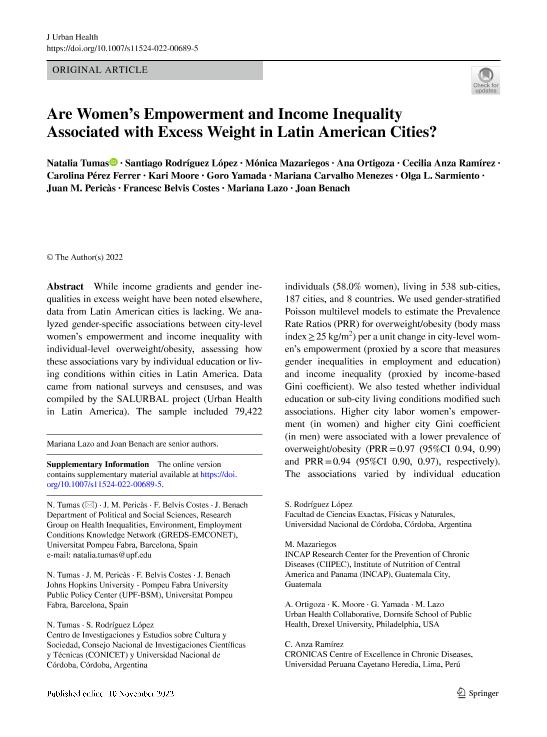Artículo
Are women’s empowerment and income inequality associated with excess weight in Latin American cities?
Tumas, Natalia ; Rodríguez López, Santiago
; Rodríguez López, Santiago ; Mazariegos, Mónica; Ortigoza, Ana; Anza Ramírez, Cecilia; Pérez Ferrer, Carolina; Moore, Kari; Yamada, Goro; Carvalho de Menezes, Mariana; Sarmiento, Olga Lucía; Pericàs, Juan Manuel; Belvis Costes, Francesc; Lazo, Mariana; Benach, Joan
; Mazariegos, Mónica; Ortigoza, Ana; Anza Ramírez, Cecilia; Pérez Ferrer, Carolina; Moore, Kari; Yamada, Goro; Carvalho de Menezes, Mariana; Sarmiento, Olga Lucía; Pericàs, Juan Manuel; Belvis Costes, Francesc; Lazo, Mariana; Benach, Joan
 ; Rodríguez López, Santiago
; Rodríguez López, Santiago ; Mazariegos, Mónica; Ortigoza, Ana; Anza Ramírez, Cecilia; Pérez Ferrer, Carolina; Moore, Kari; Yamada, Goro; Carvalho de Menezes, Mariana; Sarmiento, Olga Lucía; Pericàs, Juan Manuel; Belvis Costes, Francesc; Lazo, Mariana; Benach, Joan
; Mazariegos, Mónica; Ortigoza, Ana; Anza Ramírez, Cecilia; Pérez Ferrer, Carolina; Moore, Kari; Yamada, Goro; Carvalho de Menezes, Mariana; Sarmiento, Olga Lucía; Pericàs, Juan Manuel; Belvis Costes, Francesc; Lazo, Mariana; Benach, Joan
Fecha de publicación:
10/11/2022
Editorial:
Springer
Revista:
Journal Of Urban Health
ISSN:
1099-3460
Idioma:
Inglés
Tipo de recurso:
Artículo publicado
Clasificación temática:
Resumen
While income gradients and gender inequalities in excess weight have been noted elsewhere, data from Latin American cities is lacking. We analyzed gender-specific associations between city-level women’s empowerment and income inequality with individual-level overweight/obesity, assessing how these associations vary by individual education or living conditions within cities in Latin America. Data came from national surveys and censuses, and was compiled by the SALURBAL project (Urban Health in Latin America). The sample included 79,422 individuals (58.0% women), living in 538 sub-cities, 187 cities, and 8 countries. We used gender-stratified Poisson multilevel models to estimate the Prevalence Rate Ratios (PRR) for overweight/obesity (body mass index ≥ 25 kg/m2) per a unit change in city-level women’s empowerment (proxied by a score that measures gender inequalities in employment and education) and income inequality (proxied by income-based Gini coefficient). We also tested whether individual education or sub-city living conditions modified such associations. Higher city labor women’s empowerment (in women) and higher city Gini coefficient (in men) were associated with a lower prevalence of overweight/obesity (PRR = 0.97 (95%CI 0.94, 0.99) and PRR = 0.94 (95%CI 0.90, 0.97), respectively). The associations varied by individual education and sub-city living conditions. For labor women’s empowerment, we observed weakened associations towards the null effect in women with lower education and in residents of sub-cities with worse living conditions (men and women). For the Gini coefficient, the association was stronger among men with primary education, and a negative association was observed in women with primary education. Our findings highlight the need for promoting equity-based policies and interventions to tackle the high prevalence of excess weight in Latin American cities.
Palabras clave:
CITIES
,
INCOME INEQUALITY
,
LATIN AMERICA
,
OBESITY
,
OVERWEIGHT
,
WOMEN’S EMPOWERMENT
Archivos asociados
Licencia
Identificadores
Colecciones
Articulos(CIECS)
Articulos de CENTRO DE INVESTIGACIONES Y ESTUDIO SOBRE CULTURA Y SOCIEDAD
Articulos de CENTRO DE INVESTIGACIONES Y ESTUDIO SOBRE CULTURA Y SOCIEDAD
Citación
Tumas, Natalia; Rodríguez López, Santiago; Mazariegos, Mónica; Ortigoza, Ana; Anza Ramírez, Cecilia; et al.; Are women’s empowerment and income inequality associated with excess weight in Latin American cities?; Springer; Journal Of Urban Health; 99; 6; 10-11-2022; 1091-1103
Compartir
Altmétricas



